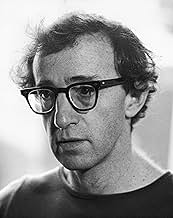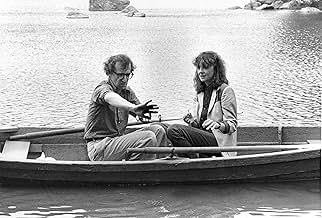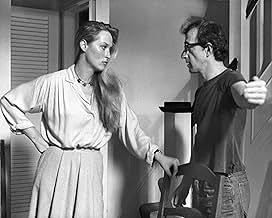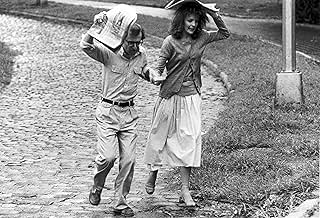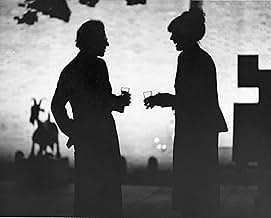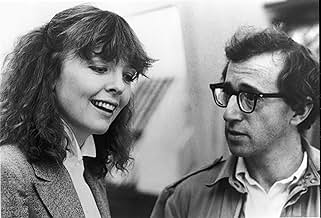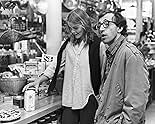Manhattan
- 1979
- Tous publics
- 1h 36m
IMDb RATING
7.8/10
152K
YOUR RATING
The life of a divorced television writer dating a teenage girl is further complicated when he falls in love with his best friend's mistress.The life of a divorced television writer dating a teenage girl is further complicated when he falls in love with his best friend's mistress.The life of a divorced television writer dating a teenage girl is further complicated when he falls in love with his best friend's mistress.
- Nominated for 2 Oscars
- 16 wins & 24 nominations total
Anne Byrne Hoffman
- Emily
- (as Anne Byrne)
- Director
- Writers
- All cast & crew
- Production, box office & more at IMDbPro
Featured reviews
Woody Allen once said that, whereas Scorsese had generated a host of imitators, he had generated none. This may be true; films like Manhattan certainly come along far too infrequently.
That this is such a gorgeous film may strike those following the formulaic, Hollywood approach to cinema as strange and heretical. The story is unexciting (restless male in love triangle), most of the characters are unsympathetic, at least on the surface (particularly Isaac), Allen leaves lose ends lying around all over the place, and there's certainly no action (unless you count the car-chase-without-a-chase-scene involving Diane Keaton, Woody Allen and a VW Beetle).
So why should any self-respecting member of the MTV generation spend time on this film? Well, here are a few reasons.
The script is wit of the highest order. This is not gag-a-minute humour like Friends, but an altogether more acute art form stemming from character, some wonderful dialogue and a fair amount of darkness (I love the bit about Isaac trying to run over his ex-wife's lover). Allen is also prepared to turn his biting satire to personal issues, such as being Jewish. Just don't expect someone to look shrug their shoulders, slap their forehead and with mid-rising intonation say d'uh! It's not that kind of comedy.
Then there is the gorgeous cinematography. Woody loves Manhattan and you can certainly tell. If there is one criticism of the film, it is that it leaves a rather picture postcard impression of the city, but I suppose if it's love, then it's love. Much of the film appears to have been shot at either sunrise or sunset to soften the light, and there are spectacular views of the towers, bridges and waterways of America's finest metropolis.
Then, I suppose, there is the fact that Manhattan is probably the archetypal Woody Allen film. Other films may be better, like Annie Hall or Hannah and Her Sisters but, in Manhattan, all the elements of Allen's style are in perfect balance. There's the jazz, the neurotic, unsympathetic lead, the choice between stable and highly-strung women, the self-mocking humour (hilariously done in the opening voice-over), the railing against intellectual snobbery, the deep unease with popular culture.
And there are great performances. Allen is at his most difficult and in some ways his least likable. As Isaac, he's trying to do the right thing, but is rarely selfless enough to follow through with it. Diane Keaton is great as Mary, the lynchpin between the two love triangles vain, pretentious and yet you can see why Isaac falls for her. Well, all the actors are great, and very believable, but special mention must go to Meryl Streep, who manages to steal the show with her tiny cameo as Isaac's ex-wife, writing a book about their break-up and living with their son and her lover. She is magnificent.
Of course, the film will also do nothing to dispel the popular rumour that New Yorkers are neurotic, self-obsessed and self-indulgent at least that narrow social circle Allen so often writes about. If you don't mind that, though (and I'm English, so what do I care) you're in for a treat. As with the city itself, the memories of this film will stay with you forever.
That this is such a gorgeous film may strike those following the formulaic, Hollywood approach to cinema as strange and heretical. The story is unexciting (restless male in love triangle), most of the characters are unsympathetic, at least on the surface (particularly Isaac), Allen leaves lose ends lying around all over the place, and there's certainly no action (unless you count the car-chase-without-a-chase-scene involving Diane Keaton, Woody Allen and a VW Beetle).
So why should any self-respecting member of the MTV generation spend time on this film? Well, here are a few reasons.
The script is wit of the highest order. This is not gag-a-minute humour like Friends, but an altogether more acute art form stemming from character, some wonderful dialogue and a fair amount of darkness (I love the bit about Isaac trying to run over his ex-wife's lover). Allen is also prepared to turn his biting satire to personal issues, such as being Jewish. Just don't expect someone to look shrug their shoulders, slap their forehead and with mid-rising intonation say d'uh! It's not that kind of comedy.
Then there is the gorgeous cinematography. Woody loves Manhattan and you can certainly tell. If there is one criticism of the film, it is that it leaves a rather picture postcard impression of the city, but I suppose if it's love, then it's love. Much of the film appears to have been shot at either sunrise or sunset to soften the light, and there are spectacular views of the towers, bridges and waterways of America's finest metropolis.
Then, I suppose, there is the fact that Manhattan is probably the archetypal Woody Allen film. Other films may be better, like Annie Hall or Hannah and Her Sisters but, in Manhattan, all the elements of Allen's style are in perfect balance. There's the jazz, the neurotic, unsympathetic lead, the choice between stable and highly-strung women, the self-mocking humour (hilariously done in the opening voice-over), the railing against intellectual snobbery, the deep unease with popular culture.
And there are great performances. Allen is at his most difficult and in some ways his least likable. As Isaac, he's trying to do the right thing, but is rarely selfless enough to follow through with it. Diane Keaton is great as Mary, the lynchpin between the two love triangles vain, pretentious and yet you can see why Isaac falls for her. Well, all the actors are great, and very believable, but special mention must go to Meryl Streep, who manages to steal the show with her tiny cameo as Isaac's ex-wife, writing a book about their break-up and living with their son and her lover. She is magnificent.
Of course, the film will also do nothing to dispel the popular rumour that New Yorkers are neurotic, self-obsessed and self-indulgent at least that narrow social circle Allen so often writes about. If you don't mind that, though (and I'm English, so what do I care) you're in for a treat. As with the city itself, the memories of this film will stay with you forever.
From a technical standpoint, this film is top-notch - the acting is brilliant, the cinematography is beautiful, and the George Gershwin soundtrack is excellent.
But the content of the film is another thing. Basically, Woody Allen comes across as an egomaniacal creep who writes parts for himself in order to make him look like he's God's gift to women (there are so many references to his sexual prowess one could start a group drinking game based off it).
And anybody with even a beginner's understanding of adolescent psychological development knows that men who pursue teenage girls are sick and sadistic bastards who find joy in ruining promising young lives.
So my summary is: Like the film for its craft, but loathe the creator for his statement.
But the content of the film is another thing. Basically, Woody Allen comes across as an egomaniacal creep who writes parts for himself in order to make him look like he's God's gift to women (there are so many references to his sexual prowess one could start a group drinking game based off it).
And anybody with even a beginner's understanding of adolescent psychological development knows that men who pursue teenage girls are sick and sadistic bastards who find joy in ruining promising young lives.
So my summary is: Like the film for its craft, but loathe the creator for his statement.
Woody Allen started off making outrageous, cheap, hit-and-miss, unpretentious comedies, the best of which were probably "Love and Death" and "Sleeper." The comedy became more rooted in reality and grafted onto an engaging story of lost love in "Annie Hall," which I think is still his best film. After that, "Interiors." Ka-Boom. Since then there have been no more absurd comedies, several gloomy dramas, and many more or less successful attempts to blend comedy with serious themes.
This is one of the dark comedies and didn't work for me. Allen is going with a high-school girl, falls for a woman nearer his own age, alienates his close friend, and finally decides -- too late -- that the younger girl is his soul mate. It ends ambiguously with her leaving for Europe. The plot is out of a soap opera. It does have some witty lines (almost all of them given to Allen himself) and a lot of inside New Yorker intellectual allusions, but, aside from the Gershwin score, isn't worth seeing twice. Really, it's pretty boring. The performances aren't bad, but Allen doesn't challenge himself either. It's his old neurotic, stuttering, put-upon persona that is by now more than familiar enough. There's just nothing new.
It isn't that Allen had run out of ideas by 1979 because he's made some successful films since then -- "Hollywood Ending" and "Broadway Danny Rose", for instance. But "Manhattan" is one of the many that simply got by me. It didn't seem charming. It seemed repetitious and pointless. I didn't bother counting the times someone meets another and says, "Hiii," using the contours of the fourth tone in Mandarin Chinese. And no one seems to say it just once during a given encounter, but several times. "Hii, hii -- how AHH you?"
I kept waiting for one of two things to happen. Either IT takes off or I get drawn in. But neither contingency was realized. I cared about the entanglements in "Annie Hall," but here it didn't matter to me who wound up with whom, and I never got the feeling that it mattered much to Allen either.
This is one of the dark comedies and didn't work for me. Allen is going with a high-school girl, falls for a woman nearer his own age, alienates his close friend, and finally decides -- too late -- that the younger girl is his soul mate. It ends ambiguously with her leaving for Europe. The plot is out of a soap opera. It does have some witty lines (almost all of them given to Allen himself) and a lot of inside New Yorker intellectual allusions, but, aside from the Gershwin score, isn't worth seeing twice. Really, it's pretty boring. The performances aren't bad, but Allen doesn't challenge himself either. It's his old neurotic, stuttering, put-upon persona that is by now more than familiar enough. There's just nothing new.
It isn't that Allen had run out of ideas by 1979 because he's made some successful films since then -- "Hollywood Ending" and "Broadway Danny Rose", for instance. But "Manhattan" is one of the many that simply got by me. It didn't seem charming. It seemed repetitious and pointless. I didn't bother counting the times someone meets another and says, "Hiii," using the contours of the fourth tone in Mandarin Chinese. And no one seems to say it just once during a given encounter, but several times. "Hii, hii -- how AHH you?"
I kept waiting for one of two things to happen. Either IT takes off or I get drawn in. But neither contingency was realized. I cared about the entanglements in "Annie Hall," but here it didn't matter to me who wound up with whom, and I never got the feeling that it mattered much to Allen either.
Let me get this out of the way: I'm a big Woody Allen fan. And this flick is absolutely and utterly his. From the black and white to the ambience and, of course, the dialog, it all screams Woody Allen as loud as it can.
As most of his movies, Woody is not simply playing a character, nor simply being himself. It is a mix, a blend between a real man and a made up persona. And, as always, the line is weirdly blurry, making it so, at times, you're watching a documentary.
The plot itself is not the central point of the story and, at times, it is hard to understand exactly what it is leading to. No, the focus of the story is the characters. Characters like Isaac, Yale and the city. Specially the city. It is an homage to a now distant past of history, viewed from the lens of a troubled mix of a real and fictional man.
It is hard to defend most of Isaac's actions. And it is way harder to get mad at them. It is a movie about imperfection, ego, society, intellectuals and love. And it is great. A great movie to be rewatched as many times as you can.
Woody Allen has been churning out mediocre films for so long now that it's easy to forget how good some of his older films were. "Manhattan" is the product of Allen's "mature" 1970s phase, the phase that also produced "Annie Hall" and "Interiors," and it's a wonderful film. It's not the plot that makes it singular -- it's typical upper-crust New York Allen, full of neurotic people in therapy cheating on one another and making mistake after mistake in their pursuit of what they think will make them happy. No, what makes "Manhattan" so effective is its style. Filmed in black and white (because, as Allen's character says in an opening voice over, New York is a city that has always and will always exist in black and white), the film is a love letter to NYC, and it suggests that the neuroses that fill its denizens are as much a part of the city's character as its architecture, culture and diversity. I would instantly be annoyed by the people that populate Allen's films if I met them in any other context. As it is, I can't imagine any Allen film (at least not one set in New York) without them.
Grade: A
Grade: A
Did you know
- TriviaMeryl Streep shot her scenes during breaks in filming Kramer contre Kramer (1979).
- GoofsIn the first scene at Elaine's, as Isaac is beginning to say something, two people (presumably customers of the restaurant, as it was running while they were shooting) walk in front of the camera. Isaac laughs, and quickly recovers with an impromptu remark about how his girlfriend has to go and do homework.
- Quotes
Isaac Davis: All the times I come over here, I can't understand how you can prefer her to me.
Jill: You can't understand that?
Isaac Davis: No. It's a mystery to me.
Jill: Well, you knew my history when you married me.
Isaac Davis: I know. My analyst warned me, but you were so beautiful that I got another analyst.
- Crazy creditsOne of the very few Woody Allen films to not have traditional opening credits, save the production company bumper (United Artists), and the film title MANHATTAN is seen as a long vertical flashing bright neon sign, located on the side of a New York City building, and is seen for under seven seconds just before Woody Allen narrates his first line.
- ConnectionsEdited into Intimate Portrait: Diane Keaton (2001)
- SoundtracksRhapsody in Blue
(1924)
Music by George Gershwin
Performed by The New York Philharmonic
Conducted by Zubin Mehta
Piano soloist: Paul Jacobs
Music director: Zubin Mehta
- How long is Manhattan?Powered by Alexa
- Is "Manhattan" based on a book?
- Why was "Manhattan" shot in black & white?
- What did Isaac mean when he told Mary that they could "trade fours"?
Details
- Release date
- Country of origin
- Language
- Also known as
- Chuyện Tình Manhattan
- Filming locations
- Production company
- See more company credits at IMDbPro
Box office
- Budget
- $9,000,000 (estimated)
- Gross US & Canada
- $39,946,780
- Opening weekend US & Canada
- $485,734
- Apr 29, 1979
- Gross worldwide
- $40,194,067
- Runtime1 hour 36 minutes
- Color
- Sound mix
- Aspect ratio
- 2.39 : 1
Contribute to this page
Suggest an edit or add missing content



